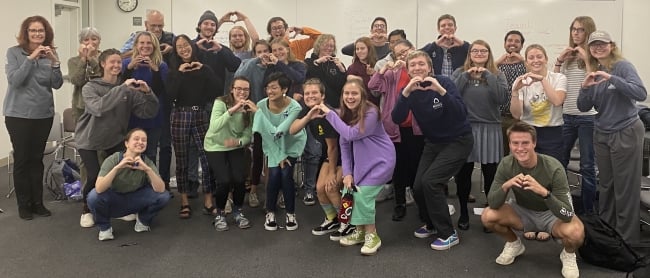You have /5 articles left.
Sign up for a free account or log in.

Colorado School of Mines encourages STEM faculty members to prioritize love in the classroom.
Colorado School of Mines
The Colorado School of Mines launched the Teaching With Heart Project in August 2022 to develop the character of love among science, technology, engineering and mathematics professors.
The group provides community engagement, regular discussion ideas and educational materials related to the subject to reframe teachers’ mind-sets and indirectly impact students by providing a more caring classroom.
What’s the need: Increasingly, college students are reporting higher levels of anxiety and depression, and professors are seeking ways to make their learning environments safe and supportive for them.
The Teaching With Heart Project seeks to address professors’ awareness of their own beliefs that shape their character and behavior in the classrooms.
“Teacher preparation in higher education traditionally focuses on design and on pedagogy. We complement these aspects of teacher preparation by addressing the mind-set and heart that teachers in higher education bring to the classroom,” says Roel Snieder, a professor of professional development education at Mines.
Teaching with love is a common idea in the K-12 sphere but is typically taboo in higher education—and particularly among STEM faculty members, Snieder explains. The Teaching With Heart Project articulates an appropriate expression of love and how it can be more palatable to those in the sciences.
What it is: The project uses a workshop series and follow-up sessions to make instructors aware of their behaviors and beliefs and, in turn, help them develop habits around the idea of love. The four-part webinar series takes place over Zoom, and each session is about two hours long. The experience is intended to be interactive, using breakout groups and chat responses from participants.
In the online community, the cohort of participants is divided into teams that meet regularly. This year’s cohort is made up of 22 professors from universities around the country, impacting around 4,500 students, Snieder says.
The project staff also create a biweekly newsletter, which provides reflection materials and activities to try in the classroom. “Newsletter topics have included prompts to share insights and reflections on the workshop series; slowing down and using HALT (hungry, angry, lonely, tired); recognizing the effects of trauma in the classroom; gaining awareness of the side effects of education; and spiritual awareness and teaching,” Snieder says.
The group also utilizes the learning management system Canvas to view materials and engage in discussion board chats.
Best practices: Snieder and the other project organizers, Cortney Holles, Qin Zhu and Cynthia James, co-authored a Physics Today article published in March on 12 best practices for teaching with heart, including:
- Use a student’s preferred name and pronouns;
- Ask open-ended questions about student needs;
- Be available for students outside the classroom;
- Be aware of privileges in the classroom;
- Be authentic and vulnerable;
- Encourage students to be brave;
- Prioritize important issues over the class agenda; and
- Focus on a student’s potential.
What’s under evaluation: The program launched around six months ago, and project managers have been tracking instructor participation. While the participants are enthusiastic, they’re often overloaded with work, creating challenges, Snieder says.
Current project materials and resources, like the webinar series and discussion topics, will be evaluated by participants. Students will also provide feedback around their faculty members’ teaching before and after participation in the Teaching With Heart program.
Scaling up: Snieder says he views this first year as a pilot stage, with future plans to scale up and include more students.
The Teaching With Heart Project participants want to develop their own materials, like articles, videos and possibly a book, to share the ideas among higher education professionals more widely.
Do you have an academic success tip that might help others encourage student success? Tell us about it.




